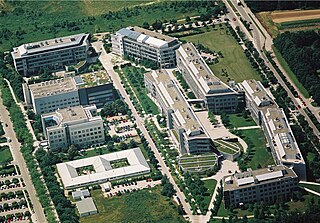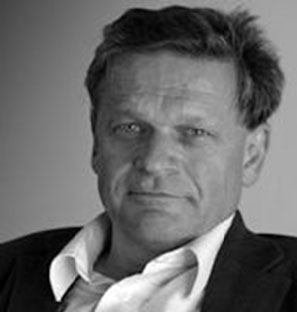Barbara Mittler (born 15 February 1968 in Hagen, West Germany) is a German sinologist. She is co-director of the Cluster of Excellence "Asia and Europe in a Global Context". [1]
Contents

Barbara Mittler (born 15 February 1968 in Hagen, West Germany) is a German sinologist. She is co-director of the Cluster of Excellence "Asia and Europe in a Global Context". [1]

Barbara Mittler was born 15 February 1968, in Hagen, West Germany. She is the daughter of flautist Uta Mittler and librarian Elmar Mittler. Mittler received her B.A. and M.A. from Oxford and her Ph.D. from Heidelberg University. She also studied Chinese at the Mandarin Training Center in Taiwan.
After her dissertation in 1994, Mittler worked as an assistant professor at Heidelberg University, where she was habilitated in 1998. She continued as an associate professor. In 2004, she became full professor at the Institute of Chinese Studies, which she managed as director until autumn 2012. At the Cluster of Excellence “Asia and Europe in a Global Context”, Mittler became speaker of the research area “Public Spheres” in 2007. Since November 2012, she is the Cluster's co-director. [2] Barbara Mittler is a member of the German Academy of Sciences LEOPOLDINA. [3]
In 2000, Mittler was awarded the Heinz-Maier-Leibnitz-Prize of the German Research Foundation and the Federal Ministry of Education and Research for her outstanding research. [4] Between 2002 and 2004, she held the Heisenberg Fellowship awarded by the German Research Foundation. [5] In 2009, Mittler received the Henry Allen Moe Prize of the American Philosophical Society for her paper Popular Propaganda? Art and Culture in Revolutionary China. [6] In this paper, Mittler addresses the question why the items of propaganda of Mao Zedong's time, a tragic period of suffering, are now popular in China, and why Mao has become a mythical figure.
Mittler's former desire to become a practicing musician (she plays the piano and the violin) led her to explore Chinese avant-garde music and fueled her passion for Chinese culture. Her research focuses on a wide range of topics such as Chinese music, Taiwanese literary and cultural history, encyclopedias and comics, Chinese women's magazines, visuality and historiography, satire and national heroes. [7]
She is married to the classical philologist Thomas A. Schmitz.

The University of Cologne is a university in Cologne, Germany. It was established in the year 1388 and is one of the most prestigious and research intensive universities in Germany. It was the sixth university to be established in Central Europe. It closed in 1798 before being re-established in 1919. It is now one of the largest universities in Germany with more than 50,000 students. The University of Cologne is a member of the German U15 association of major research-intensive universities and was a university of excellence as part of the German Universities Excellence Initiative from 2012 to 2019. It is constantly ranked among top 20 German universities in the world rankings.
Yuan Ze University is a private university located in Taoyuan City, Taiwan. Established in 1989, YZU campus is in Zhongli District, Taoyuan; Taipei; and Bade District, Taoyuan.
William C. Kirby is T. M. Chang Professor of China Studies and Spangler Family Professor of Business Administration at Harvard University. He is the chairman of the Harvard China Fund, Faculty Chair of the Harvard Center Shanghai, Harvard's first University-wide center located outside the United States, former Director of Fairbank Center for Chinese Studies, former Chair of the History Department and the former Dean of the Harvard Faculty of Arts and Sciences, where he oversaw 10,000 students, 1,000 faculty members, 2,500 staff, and an annual budget of $1 billion and announced his resignation after a four-year tenure on January 27, 2006.
Lothar Ledderose is a German professor of the History of Art of Eastern Asia at the University of Heidelberg. A renowned authority in his field, he received the prestigious Balzan Prize in 2005.

Rudolf G. Wagner was a German sinologist. He was Senior Professor at the Department of Chinese Studies at the Heidelberg University and Co-Director of the Cluster of Excellence "Asia and Europe in a Global Context: Shifting Asymmetries in Cultural Flows".
The Excellence Initiative of the German Council of Science and Humanities and the German Research Foundation (DFG) aims to promote cutting-edge research and to create outstanding conditions for young scholars at universities, to deepen cooperation between disciplines and institutions, to strengthen international cooperation of research, and to enhance the international appeal of excellent German universities. It is the result of lengthy negotiations between the federal government and the German states.

The Center for Integrated Protein Science Munich (CIPSM) is a cluster of excellence in sciences located in Munich. It is an association of research groups of the Ludwig Maximilian University of Munich, the Technical University of Munich, the Helmholtz Center Munich, and the Max Planck Institutes of biochemistry and neurobiology in Martinsried. Research at the center expands from isolated proteins up to proteins in living organisms applying methods of biophysics, biochemistry, medicine, and biology.
Mark C. Elliott is the Mark Schwartz Professor of Chinese and Inner Asian History at Harvard University, where he is Vice Provost for International Affairs. He is also one of the scholars who form part of the school called the New Qing History.

Shih-Hui Chen is a Taiwanese composer who lives and works in the United States.
Pan Shiji or Chew Shyh-Ji is a Taiwanese composer, writer and music educator.
The Cluster of Excellence "Asia and Europe in a Global Context" is a research facility funded in the framework of the German Universities Excellence Initiative of the federal state governments of Germany since October 2007. It is a trans- and interdisciplinary network of researchers affiliated with Heidelberg University. Key research areas of the Cluster are the processes of exchange between cultures of Asia and Europe, ranging from migration and trade to the formation of concepts and institutions.

Axel Michaels is a Professor of Classical Indology and Religious Studies at Heidelberg University, former Co-Director of the Cluster of Excellence "Asia and Europe in a Global Context" (2014-2019) and since 2014 the Director of the research project Documents on the History of Religion and Law of Pre-modern Nepal. He also was the Speaker of the Collaborative Research Centre SFB 619 “Ritual Dynamics” from 2002 until 2013.

Thomas Maissen is a professor of modern history at Heidelberg University and co-director of the Cluster of Excellence "Asia and Europe in a Global Context". As of September 2013 he is detached as director of the German Historical Institute in Paris.
Diamantis Panagiotopoulos is an Aegean Bronze Age archaeologist and Director of the Institute of Classical Archaeology at the University of Heidelberg.
Johannes Quack is a German ethnologist at the Goethe University Frankfurt whose primary field of study is religion. He is also the head of the Emmy Noether Research Group “Diversity of Non-Religiosity” at the Goethe University Frankfurt.
Rohini Kuner is an Indian-born German pharmacologist and director of the Institute of Pharmacology at Heidelberg University.
Birgit Kellner is an Austrian Buddhologist and Tibetologist. She studied Buddhology and Tibetology at University of Vienna, where she received a master's degree in 1994 under the supervision of Ernst Steinkellner, and at the Hiroshima University, where she earned her doctorate in 1999 under the supervision of Katsura Shōryū.
Kerstin von Lingen is a German military historian who specialises in the study of war crimes. She is best known for her works on Field Marshal Albert Kesselring and SS Obergruppenfuehrer Karl Wolff.
Al Siyassa Al Musawwara also known as as-Siyasa al-Musawwara, was a multilingual magazine. The magazine was also referred to as the Cairo Punch. It was started in 1907 in Cairo, Egypt, but when the publisher Abdul Hamit Zaki forced to exile it was published in Bologna, Italy, until 1923.
Andrea Bréard is a German historian of mathematics and sinologist specializing in Chinese mathematics. She is Alexander von Humboldt Professor of Sinology in the Department of Classical World and Asian Cultures at the University of Erlangen–Nuremberg.